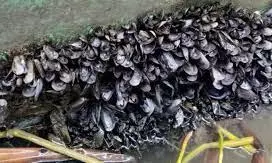
Invasive Caribbean false mussel species wiping out native clams, oysters in Kerala
It has spread across estuaries from Thiruvananthapuram to Kasaragod and has now started affecting the mussel aquaculture farms

The coastal waters of Kerala are witnessing a massive spread of an invasive species, the Caribbean false mussel (mytilopsis sallei), which is wiping out the native clams and oysters that are crucial for the state’s fisheries, a report from the Intergovernmental Platform on Biodiversity and Ecosystem Services (IPBES) said.
The latest ‘Assessment Report on Invasive Alien Species and Their Control’ from IPBES said the Caribbean false mussels, originally from the Atlantic and Pacific coast of South and Central America, have spread widely through the coastal waters of Kerala.
The report said the invasive species could have reached the Indian coast through ballast waters (the seawater that ships carry inside for better stability) and later spread to the estuaries through smaller fishing vessels.
Spread across estuaries
“It’s possible that tropical cyclone Ockhi, which struck the Kerala coast in 2017, may have triggered the spread of the ‘Varathan Kakka’ (‘alien bivalve mollusk’ in Malayalam) across the state by carrying it into new waters,” the report said.
IPBES has referred to a study on this species conducted by A Biju Kumar, professor and Head of the Department of Aquatic Biology and Fisheries in the Kerala University, along with Ravinesh R, his department colleague, Oliver PG from the National Museum of Wales in Cardiff, Tan SK from Lee Kong Chian National History Museum in Singapore, and Sadasivan K from Travancore Nature History Society.
“This invasive species has spread across estuaries from Thiruvananthapuram to Kasaragod. It has now started affecting the mussel aquaculture farms also in Kerala,” lead author of the report, Biju Kumar A, told PTI.
He said this edible mussel, smaller in size compared to that of native mussel species to Kerala, has caused mass displacement of the native variant. “The Caribbean false mussel reproduces rapidly and is very tolerant, and can even survive in freshwater. They grow in the similar habitats where our mussels grow and displace them massively,” Biju Kumar said.
Tough to control
According to him, controlling the spread of this species now would be impossible. He said the only way to reduce the number would be to harvest as much as possible so that there would be stock replacement of our native species.
He said Kerala is yet to carry out an assessment regarding the economic loss to the fisheries sector due to the extensive spread of the invasive species and resultant displacement of the native variants. “We only know that in most areas these invasive mussels are harvested and sold, instead of our native varieties. A full-scale economic impact assessment needs to be done,” Biju Kumar said.
The IPBES report said more than 37,000 species have been introduced by many anthropogenic activities to regions and biomes around the world. “The conservative estimate is now rising at unprecedented rates. More than 3,500 of these are harmful invasive alien species-seriously threatening nature, nature’s contribution to people, and good quality of life,” the IPBES report said.
Approved on Saturday in Bonn, Germany, by the representatives of 143 member states to IPBES, the report found that alongside dramatic changes to biodiversity and ecosystems, the global economic cost of invasive alien species exceeded USD 423 billion in 2019.
(With agency inputs)

